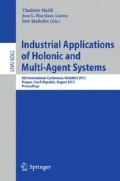Abstract
Currently applied process automation solutions rely on predefined control recipes with preprogrammed material transfer routes in the subjacent control software. Thus, the flexibility is limited with regard to dynamic environment conditions such as a change of production job priorities or a modification of the system layout. In this context, agent technology is seen as a promising approach for providing such flexibility. This paper presents a multi-agent system for batch process automation, which introduces the concept of phase agents for controlling the physical equipment. The phase agents incorporate control software based on the standard IEC 61131 for PLC programming in consideration of compliance to the standard IEC 61512 Batch Control. In the context of material transfers, a route finding algorithm is introduced for dynamically calculating suitable routes. Moreover, demonstration applications are presented to show the feasibility of the approach.
Access this chapter
Tax calculation will be finalised at checkout
Purchases are for personal use only
Preview
Unable to display preview. Download preview PDF.
References
Guo, Q.L., Zhang, M.: An agent-oriented approach to resolve scheduling optimization in intelligent manufacturing. Robotics and Computer-Integrated Manufacturing 26(1), 39–45 (2010)
Mes, M., van der Heijden, M., van Harten, A.: Comparison of agent-based scheduling to look-ahead heuristics for real-time transportation problems. European Journal of Operational Research 181(1), 59–75 (2007)
Brennan, R.: Toward Real-Time distributed intelligent control: A survey of research themes and applications. IEEE Transactions on Systems, Man, and Cybernetics, Part C: Applications and Reviews 37(5), 744–765 (2007)
Rajakumar, S., Arunachalam, V., Selladurai, V.: Workflow balancing strategies in parallel machine scheduling. The International Journal of Advanced Manufacturing Technology 23, 366–374 (2004)
Wahab, M., Stoyan, S.: A dynamic approach to measure machine and routing flexibilities of manufacturing systems. International Journal of Production Economics 113(2), 895–913 (2008)
Vrba, P., Mařík, V.: Capabilities of dynamic reconfiguration of Multiagent-Based industrial control systems. IEEE Transactions on Systems, Man and Cybernetics, Part A: Systems and Humans 40(2), 213–223 (2010)
Merdan, M., Lepuschitz, W., Axinia, E.: Advanced Process Automation Using Automation Agents. In: Proceedings of the 5th International Conference on Automation, Robotics and Applications, pp. 34–39 (2011)
Jämsä-Jounela, S.L.: Future trends in process automation. Annual Reviews in Control 31(2), 211–220 (2007)
Leitao, P.: Agent-based distributed manufacturing control: A state-of-the-art survey. Engineering Applications of Artificial Intelligence 22(7), 979–991 (2009)
Jennings, N., Bussmann, S.: Agent-based control systems: Why are they suited to engineering complex systems? IEEE Control Systems Magazine 23(3), 61–73 (2003)
Metzger, M., Polaków, G.: A survey on applications of agent technology in industrial process control. IEEE Transactions on Industrial Informatics 7(4), 570–581 (2011)
International Electrotechnical Commission: IEC 61131 Programmable controllers – Part 3: Programming languages, Geneva (1993)
International Electrotechnical Commission: IEC 61512 Batch Control – Part 1: Models and Terminology, Geneva (1997)
Parker, M., Rawtani, J.: Practical Batch Process Management. Newnes, The Netherlands (2005)
Kuikka, S.: A batch process management framework: Domain-specific, design pattern and software component based approach. PhD thesis, Helsinki University of Technology, Espoo (1999)
Dijkstra, E.W.: A Note on Two Problems in Connexion with Graphs. Numerische Mathematik 1(1), 269–271 (1959)
Telecom Italia: Jade - Java Agent Development Framework (access date March 2013)
Rockwell Automation: CompactLogix Control Systems (access date March 2013)
COPA-DATA: HMI SCADA Software zenon by COPA-DATA (access date March 2013)
OPC Foundation: OPC Unified Architecture (access date March 2013)
Author information
Authors and Affiliations
Editor information
Editors and Affiliations
Rights and permissions
Copyright information
© 2013 Springer-Verlag Berlin Heidelberg
About this paper
Cite this paper
Lepuschitz, W., Groessing, B., Axinia, E., Merdan, M. (2013). Phase Agents and Dynamic Routing for Batch Process Automation. In: Mařík, V., Lastra, J.L.M., Skobelev, P. (eds) Industrial Applications of Holonic and Multi-Agent Systems. Lecture Notes in Computer Science(), vol 8062. Springer, Berlin, Heidelberg. https://doi.org/10.1007/978-3-642-40090-2_4
Download citation
DOI: https://doi.org/10.1007/978-3-642-40090-2_4
Publisher Name: Springer, Berlin, Heidelberg
Print ISBN: 978-3-642-40089-6
Online ISBN: 978-3-642-40090-2
eBook Packages: Computer ScienceComputer Science (R0)

